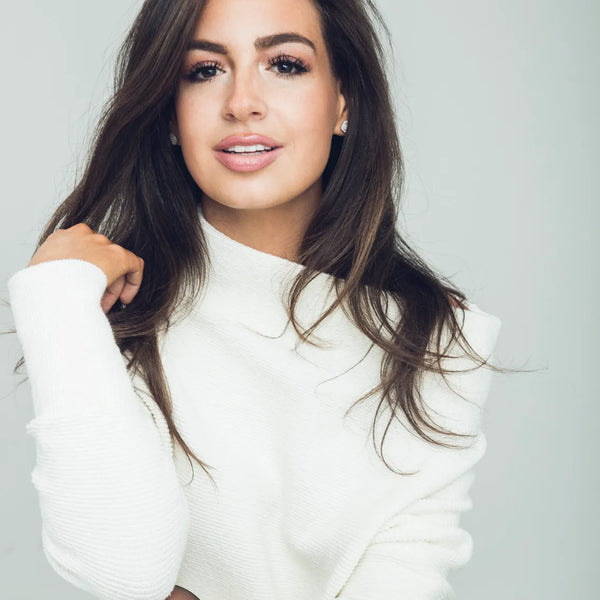How To Launch A Successful Podcast According To A Network Founder
If you are anything like me… and I know you are, you too love the sheer amount of diverse and creative podcasts that are launching every day from true crime to self development to comedy and business. It is a medium that I love to consume daily as I’m walking the dog or soaking in the bath in the evening. I love that every host is creating a unique tone of voice and you can sometimes feel like you are just having a chat with a bestie.
The trend has really amplified to leave behind that word and become a trusted and pionnering media channel giving the host the opportunity to create evergreen long form content.
Who am I to be talking about a podcast you may ask, well, I have a little experience. I am the host of Chart Topping The Mindset and Me Podcast and the co-founder of an international female self development podcast network called Monday Network. I want to share with you every lesson I learnt from the creation to the execution of recording and marketing a podcast so that the hard work is done for you. Save this article in your notes to refer back to when you need it. I want to preface that the market is not over saturated, there is space for you and really absorb this mantra:
“I have unique and valuable things to say” - because you do, and I want to hear them!
Step 1: Pick your theme
The way to really stand out in the podcast world is to think of a theme that is really close to your heart of your field of expertise. I do personally believe that you really need to carve out a niche in order to be discovered and to really cement yourself in the industry. The great thing about podcasts is that it can be anything you like at all - but really think about what is going to be interesting to you to talk about week after week. When you seem stagnant or bored the listener will really pick up on that. I really notice when a host has prepped all the questions just one after another and isn't listening to the guest and engaging, they just ask the next question. That's just my little podcast pet peeve.
Step 2: Consistency
A really important part of podcasting is to be consistent and decide how often you are going to publish your episodes and stick to it. I must say that there is a lot more work that goes into a podcast than we expect and so look at your life and assess how much time you have for it: if it's weekly, bi-monthly, monthly it doesn't matter - but you must stick to it. The next thing is to pick a day of the week and stick to that so that your listeners can look forward to the next episode coming out. I have bi-weekly episodes consisting of one full episode on a Wednesday and a mini meditation on Sunday so that my listeners know exactly what to expect.
Step 3: Format
Once you have decided on the above now comes the fun part in deciding the format of your episodes. Perhaps you want to be a solo host and share all your pearls of wisdom each week or maybe you want to interview great experts in their field? It's really important to decide on your style. I will say that I do 80% guest interviews and 20% solo episodes and it's a lovely mix. If a guest cancels at the last minute (which does happen) I have a backup to pull together a solo episode and not let the listener down. The great thing with having guests is that they also share your content for your episode and you get to reach a new audience that perhaps didn't know you before.
Step 4: Sound
There is nothing worse than a tinny sounding podcast. Please no, my ears cannot take it. If you want someone to stay with you on their commute you are going to need to invest in a good microphone and recording software. I use a Blue Yeti Microphone and Squadcast to record, it works like zoom but the sound is recorded into wav files and it's of such high quality for the listener.
Step 5: Editing
Once you have started recording your episodes I would ask yourself how much time you have to edit and if it's worth your time or is it more efficient to outsource. I looked at the cost per hour that it would take for me to edit vs using a sound engineer. For me personally I outsourced my editing and I have not looked back!
Step 6: Branding
How exciting that we get to create anything that we like in this world and put it out onto platforms for all to enjoy. I love playing around with tones and designs to really showcase my guests. Canva is so easy to use and you can create great cover art in minutes for your podcast. I really do think having a bold cover that draws people in who may discover the podcast is key. You want to think about the type of emotion you are trying to evoke, for example mine is very neutral as it goes with my personal brand but also I want people to feel calm and slow down, take their time. It can also be nice to try out a few things, maybe even ask your audience what they prefer and go from there.
Step 7: Marketing
Despite podcasts being audio I would now say that video is king. OF COURSE! Therefore creating clips of your podcast including the guest or yourself is non-negotiable now. Perhaps you can create montages or BTS footage or bloopers? (my goodness I have a lot of them!)
Creating a podcast is such an incredible way to really teach your audience and create a loyal following. The most important thing is that you have fun! You get to enjoy every moment of it as this content lives forever and it is a gift to create. I hope you found this useful and you can reach out to me @kirstyraynor to ask anything, I am always here to help. I can’t wait to listen to your podcast!











